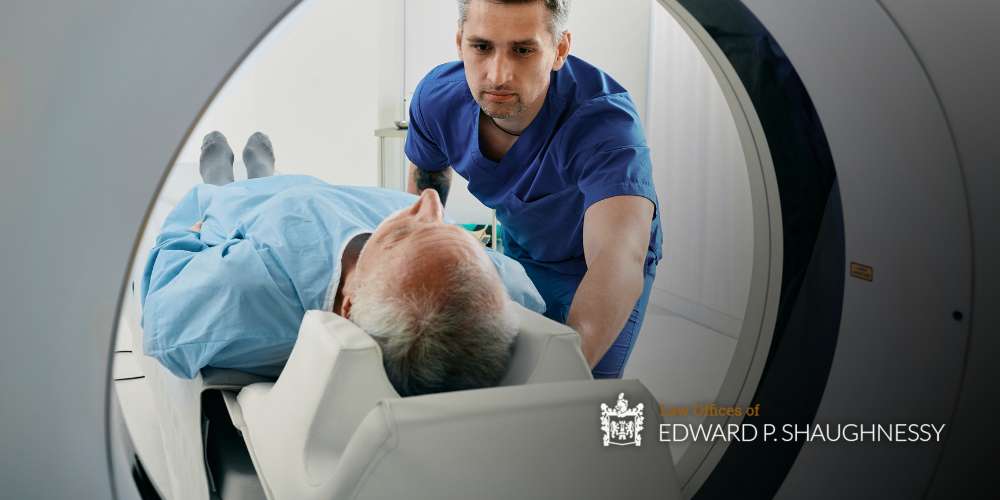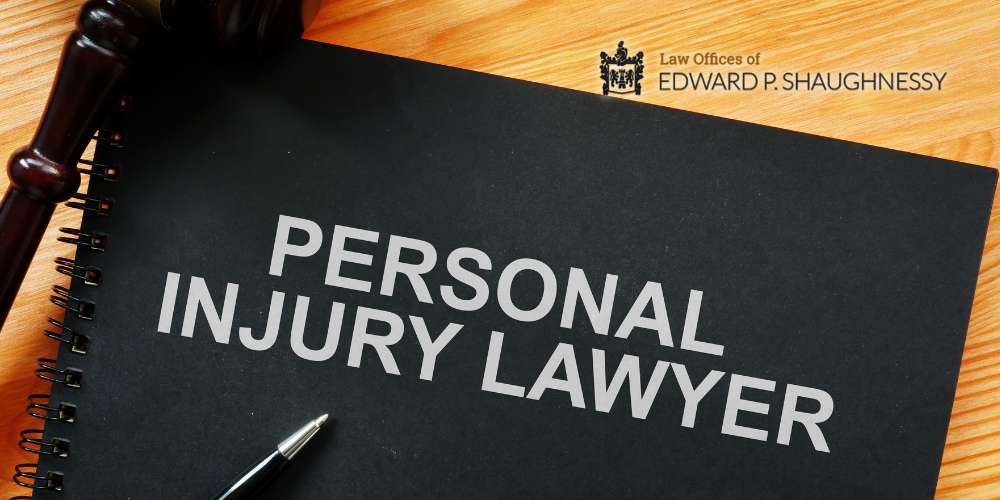It only takes a brief moment for a blow to the head to cause serious, lasting damage. Whether from a car crash, a fall, or a hard hit while playing sports, the signs of a concussion are not always immediate, but they should never be ignored. What starts as a mild traumatic brain injury may quickly become a serious brain injury without timely medical care.
At the Law Offices of Edward P. Shaughnessy, we know how important it is to take every head injury seriously. As a brain injury lawyer in Easton, PA, Attorney Ed Shaughnessy represents individuals and families dealing with the aftermath of traumatic brain injuries caused by car accidents, falls, contact sports, and other preventable incidents. We’ll work to hold the at-fault party accountable and help you pursue the compensation you need to move forward.
If you believe your injury may involve a concussion or other brain injury, don’t wait. Call (610) 258-9955 to speak with our office and get answers about your legal options today.
What is a Concussion?
A concussion is a type of mild traumatic brain injury caused by a bump, jolt, or blow to the head. It can also result from violent shaking of the head or upper body, such as in a car accident or fall. This impact causes the brain to shift within the skull, potentially damaging brain cells and disrupting blood vessels. This causes normal brain function to be temporarily impaired.
Even though it is classified as “mild,” a concussion can still be a serious injury. A concussion interferes with how brain cells communicate, which can affect brain function and trigger a range of physical, cognitive, and emotional symptoms. It may lead to further complications, including post-concussion syndrome or more serious brain injury, if left untreated.
Common Causes of Concussions
A concussion can result from any incident that causes head trauma or a sudden jolt to the body. Common causes include:
- Car accidents
- Slip and fall incidents
- Contact sports, such as football, soccer, or hockey
- Bicycle and pedestrian accidents
- Physical altercations or assaults
- Workplace injuries
- Blast injuries in military settings
In each of these situations, the impact can cause the brain to shift inside the skull, leading to a mild traumatic brain injury and temporary loss of normal brain function.

How to Know If You Have a Concussion
After a head injury, concussion signs may appear right away or take several hours, or even days, to develop. Common symptoms include headache, dizziness, confusion, and in some cases, loss of consciousness. A person can still have a concussion, though, without losing consciousness.
If you feel “off” after a blow to the head or start to notice unusual changes in thinking, balance, or behavior, don’t wait. These may be early symptoms of concussion or another type of traumatic brain injury. A healthcare professional can evaluate your condition, assess your brain function, and determine the right course of medical care.
Physical Concussion Symptoms
Physical concussion symptoms are typically the first to appear and are easier to recognize. Some of these symptoms include:
- Headache or pressure in the head
- Dizziness or lightheadedness
- Nausea or vomiting, including repeated vomiting
- Blurry vision or sensitivity to light
- Fatigue or drowsiness
- Balance problems or trouble walking
- Slurred speech
Any of these physical symptoms after a head injury should be taken seriously.
Cognitive Concussion Symptoms
Cognitive symptoms of a concussion can temporarily impact brain function, leading to issues with thinking and processing information. This can include:
- Confusion or feeling mentally “foggy”
- Memory problems, such as trouble remembering events before or after the injury
- Trouble concentrating or following conversations
- Difficulty recognizing people or places
- Slower response times or decreased coordination
These symptoms may be subtle at first, but they can significantly interfere with daily routines.
Emotional Concussion Symptoms
Emotional changes are a lesser-known but common effect of brain injury. Some emotional concussion symptoms include:
- Irritability or agitation
- Sadness or feelings of depression
- Nervousness or anxiety
- Unusual behavior or emotional reactions
If mood changes occur suddenly after a head injury, they could be signs of a concussion or even post-concussion syndrome.
Sleep Disturbances After a Concussion
Concussions can disrupt sleeping patterns in several ways. Some people sleep far more than usual, while others struggle to fall asleep or wake up frequently during the night. These changes are common symptoms of concussion and may continue for days or weeks after the injury. Sleep disturbances can slow brain function and interfere with recovery, especially when combined with other symptoms like fatigue, irritability, or mood swings.
People with a history of multiple concussions may be more likely to experience long-term sleep issues and delayed healing. Monitoring sleep habits during recovery is crucial, as quality rest plays a vital role in the brain’s healing process after a traumatic brain injury.
Signs of Concussion in Children
Children may experience the same concussion symptoms as adults, but they don’t always have the language to explain how they feel. Because of this, parents and caregivers need to be alert for signs and symptoms of concussion following common injuries or blows to the head.
According to the Centers for Disease Control, younger children may show symptoms such as persistent crying, unusual irritability, refusal to eat or nurse, lack of interest in toys, vomiting, or changes in speech. These signs may appear immediately or develop gradually after a head injury.
In older children and teenagers, recognizing concussion signs can still be difficult. Teens may downplay symptoms like dizziness, slurred speech, clumsiness, or confusion to avoid missing school, sports, or other responsibilities.
Some individuals may return to high-risk activities too soon, such as driving. The dangers of teens resuming driving too soon after a concussion are incredibly serious. Slowed reaction times, fatigue, and impaired brain function can increase the risk of car crashes or repeated concussions.
Returning to physical activity before fully healing may make symptoms worse, and can even raise the risk of second-impact syndrome. This rare but life-threatening condition occurs when a second concussion happens before the brain has recovered from the first.
Parents should take all symptoms seriously and seek medical attention if there is any concern about a suspected concussion. A healthcare provider can evaluate the child and determine when it is safe to resume physical activity, schoolwork, and other daily routines.

How Are Concussions Diagnosed?
Diagnosing a concussion starts with a detailed medical history and questions about how the head injury occurred. A healthcare professional will assess the timing and severity of symptoms, as well as any previous concussion or medical conditions that could affect recovery. A neurological exam is typically performed to evaluate vision, balance, memory, coordination, and mental status.
To rule out more serious complications like a skull fracture or brain swelling, imaging tests such as magnetic resonance imaging (MRI) or a CT scan may be recommended. Although these tests cannot detect all concussion signs, they help identify structural damage that may require urgent care.
Some athletes take a baseline test, which allows a medical professional to establish a baseline for their mental and physical capacities. If they experience a blow to the head, medical professionals or sports med athletic trainers can evaluate the athlete to better determine if they have suffered from a concussion.
How Long Do Concussion Symptoms Last?
Concussion symptoms typically last between 7 and 21 days. Most people recover fully within two to three weeks with proper rest and limited physical activity. In some cases, symptoms occur for a longer period and may require follow-up care from a healthcare provider.
Recovery time can vary based on several factors, including age, previous concussion history, family history of brain injury, and the severity of the head injury. Individuals with multiple concussions or underlying medical conditions may experience delayed healing and face a higher risk of post-concussion syndrome.
What is Post-Concussion Syndrome?
Post-concussion syndrome happens when symptoms persist for weeks or months after the initial injury. These ongoing issues can affect physical activity, mental status, and emotional well-being. Common symptoms include: headaches, dizziness, trouble concentrating, irritability or mood swings, and fatigue.
If symptoms worsen or persist longer than expected, consult a healthcare provider. Long-term symptoms may indicate damage to brain tissue or an underlying issue that needs treatment.
What to Do If You Suspect a Concussion or Other Brain Injury
If you’ve had a blow to the head, avoid physical exertion and monitor your symptoms closely. Even if the injury seems minor, it’s important to be evaluated by a healthcare professional. Do not return to physical activity, work, or school until a doctor has cleared you.
Keep a record of your symptoms, sleep changes, and emotional shifts. This information may be useful for medical care and any personal injury claim you may file.
How Long After a Concussion Can You Sleep?
There is a common belief that sleeping after a concussion is dangerous. The truth is, once a healthcare professional has ruled out life-threatening complications, it is safe to sleep. Rest is an important part of recovery. However, someone should monitor you during the first 24 hours for any new or worsening symptoms.
When to Seek Emergency Medical Attention
If you experience a suspected concussion with severe or worsening symptoms, go to the nearest emergency department right away. These symptoms include:
- Repeated vomiting
- Loss of consciousness or temporary loss of awareness
- Seizures
- Slurred speech or trouble walking
- One pupil is larger than the other
- Symptoms worsen after a brief period of improvement
- Blood or fluid leaking from the nose or ears
These danger signs could indicate brain swelling, bleeding, or damage to blood vessels. Contact a healthcare provider immediately, and follow up with an Easton catastrophic injury lawyer if negligence may have played a role.
Can You File a Personal Injury Claim for a Concussion in Pennsylvania?
Yes. If your concussion was caused by someone else’s actions, such as a negligent driver, property owner, or employer, you may be eligible to file a personal injury claim. In Pennsylvania, head injuries from car crashes, falls, and workplace accidents remain a leading cause of traumatic brain injury. As concussion rates continue to rise, especially in contact sports and everyday accidents, legal action may be necessary to recover damages.
Pennsylvania law allows injured individuals to seek compensation for medical expenses, lost income, and pain related to a concussion or other serious brain injury.
Easton personal injury attorney Ed Shaughnessy is proud to represent clients dealing with serious injuries from car crashes, slip and fall accidents, and workplace incidents. We help gather medical records, evaluate your claim, and fight to recover the compensation you deserve.

Suffered a Head Injury? Call Easton, PA Traumatic Brain Injury Lawyer Ed Shaughnessy Today
One concussion can disrupt your life in ways you may not expect. If left untreated, a mild traumatic brain injury can lead to long-term complications, like permanent damage to brain function.
Whether your injury resulted from a car crash, a fall, or a workplace accident, it’s important to act quickly. A suspected concussion requires immediate medical attention, and in many cases, legal guidance. If someone else’s negligence caused your injury, you may have a right to compensation for medical bills, lost wages, and the personal impact of your recovery.
At the Law Offices of Edward P. Shaughnessy, we understand the physical, emotional, and financial toll that a brain injury can take. As a trusted brain injury lawyer in Easton, PA, Ed Shaughnessy has decades of experience representing clients with serious injuries caused by preventable accidents.
If you or a loved one is showing signs of a concussion, don’t wait. Protect your health and your rights. Call the Law Offices of Edward P. Shaughnessy at (610) 258-9955 or contact us online to schedule a free consultation today.






